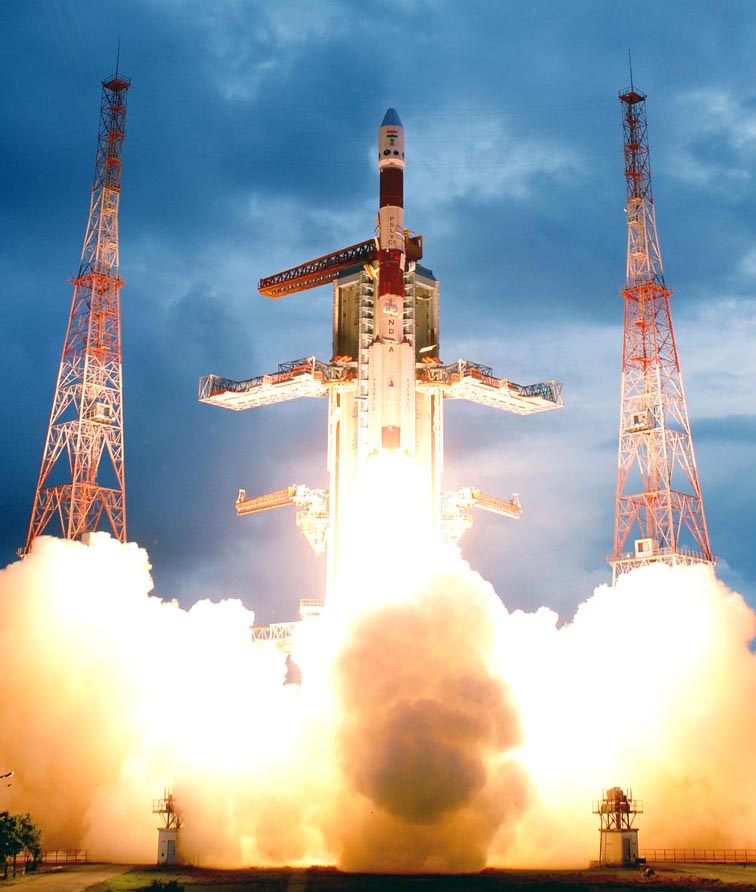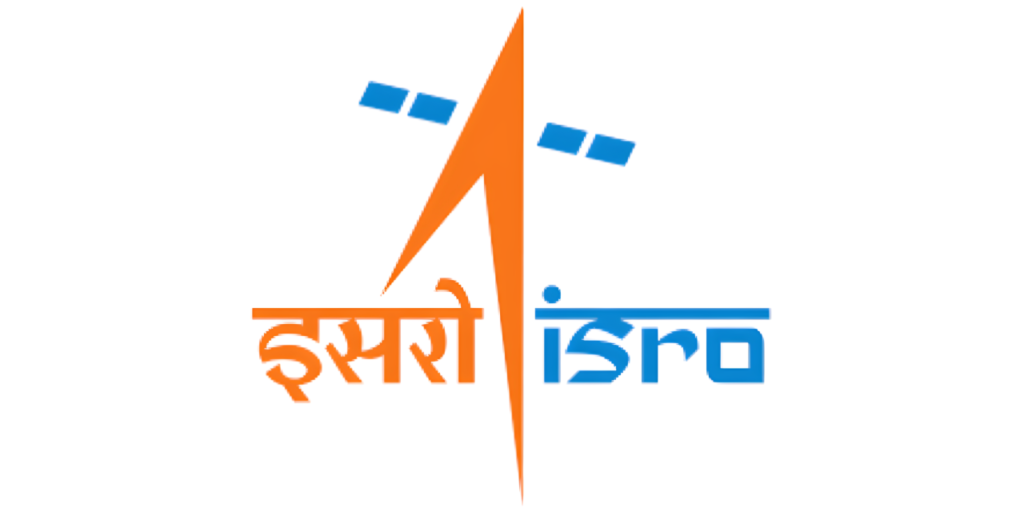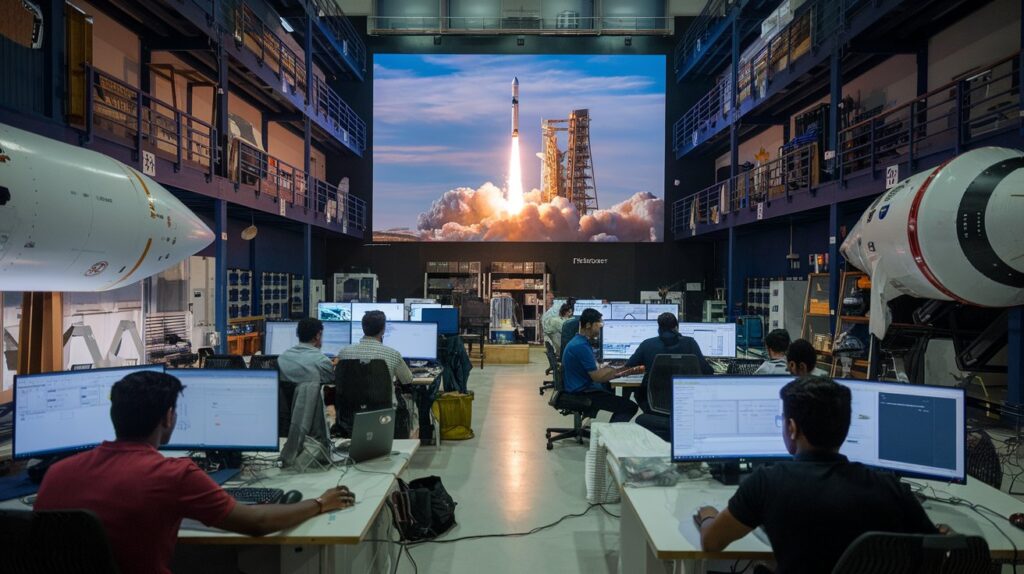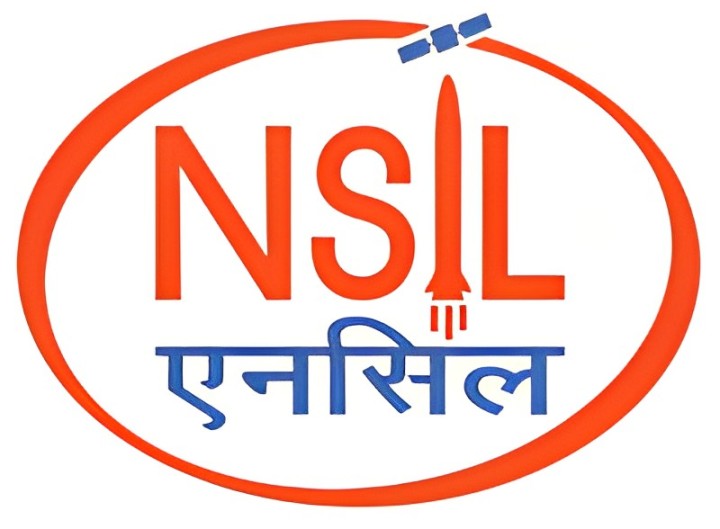- Home
- /
- Entrepreneurship
- /
- The Rise of Space Entrepreneurship…
Introduction
India’s space sector has long been a symbol of the nation’s scientific and technological prowess. For decades, the Indian Space Research Organisation (ISRO) has led the charge, launching satellites, exploring the Moon and Mars, and building a reputation as a reliable partner in global space ventures. However, a new chapter is unfolding in India’s space journey—one that is driven not just by the government, but by a burgeoning ecosystem of space startups. This article delves into the rapid evolution of space entrepreneurship in India, the key players, and the potential future of this exciting frontier.
India’s Space Economy: A Snapshot

As of 2023, India’s space economy is valued at approximately $8 billion, contributing around 2% to the global space economy. This figure, while modest on a global scale, represents a solid foundation for growth. The Indian government spends about $2 billion annually on space activities, a figure that underscores the country’s commitment to maintaining and expanding its space capabilities. Since 1999, India has launched 381 foreign satellites for 34 countries, generating $279 million in revenue. This impressive track record has positioned India as a key player in the global space market, which is projected to reach $1 trillion by 2040.
ISRO: The Trailblazer

ISRO’s accomplishments have laid the groundwork for the current wave of space entrepreneurship in India. Missions like Chandrayaan-2, which confirmed the presence of water on the Moon, and Mangalyaan, India’s Mars Orbiter Mission, have not only advanced scientific knowledge but also demonstrated India’s capabilities on the global stage. More recently, the successful soft landing of Chandrayaan-3 on the Moon’s south pole has further cemented ISRO’s status as a leader in space exploration.
Beyond its missions, ISRO has played a pivotal role in fostering space entrepreneurship. The organization’s reliable and cost-effective Polar Satellite Launch Vehicle (PSLV) has become a preferred choice for launching foreign satellites. This commercial success has encouraged the emergence of private players in the space sector, creating a dynamic ecosystem where government and private enterprises collaborate to push the boundaries of space technology.
The Emergence of Space Startups in India

In recent years, India has witnessed a surge in space startups, each bringing innovative solutions to various aspects of space exploration and technology. As of 2023, there are 189 space startups in India, a dramatic increase from just one in 2012. These startups have attracted significant investment, with funding reaching $124.7 million in 2023, up from $67.2 million in 2021. This influx of capital reflects the growing confidence in the potential of India’s space sector. Here, we delve into some of the most notable space startups in India, each of which is contributing to the country’s space ambitions through innovative solutions and cutting-edge technology.
Pixxel: Revolutionizing Earth Observation

Pixxel, a startup founded in 2019 by Awais Ahmed and Kshitij Khandelwal, focuses on Earth observation. The company aims to deploy a constellation of hyperspectral imaging satellites that can capture data in multiple wavelengths across the electromagnetic spectrum. Unlike traditional imaging satellites that capture images in a few broad bands, hyperspectral imaging can detect hundreds of narrow bands, making it possible to identify specific materials, monitor environmental changes, and assess agricultural health with unprecedented precision.
Key Achievements and Goals
- Global Coverage: Pixxel’s goal is to create a global constellation of small satellites that provide real-time, high-resolution images of the Earth. These images can be used for applications in agriculture, forestry, disaster management, climate monitoring, and urban planning.
- Innovation: Pixxel’s satellites are designed to be smaller and more cost-effective than traditional Earth observation satellites, making advanced imaging technology accessible to a broader range of users.
- Collaborations: Pixxel has entered into partnerships with global organizations and governments to provide valuable Earth observation data, which is critical for addressing global challenges such as food security and climate change.
Skyroot Aerospace: Democratizing Space Access

Skyroot Aerospace, co-founded by Pawan Kumar Chandana and Naga Bharath Daka in 2018, is a startup that aims to make space accessible by providing affordable and reliable small satellite launch vehicles. The company is developing a series of launch vehicles under the brand name Vikram, named after Dr. Vikram Sarabhai, the father of India’s space program.
Key Achievements and Goals
- Vikram Series: Skyroot’s Vikram series of rockets are designed to carry payloads of varying sizes, catering to the growing demand for small satellite launches. These vehicles are modular, allowing for customization based on the specific needs of each mission.
- Cost Efficiency: By leveraging 3D printing technology and advanced materials, Skyroot aims to reduce the cost of launching small satellites, making space missions more affordable for startups, research institutions, and commercial enterprises.
- Technological Milestones: Skyroot became the first private Indian company to test a fully 3D-printed cryogenic engine, which is critical for future space missions. The company’s achievements have attracted significant investment, including backing from prominent investors and venture capitalists.
- International Collaboration: Skyroot is positioning itself as a global player in the small satellite launch market, with plans to offer its services to international clients. The company has already secured agreements with several international customers.
Agnikul Cosmos: Tailored Launch Solutions

Agnikul Cosmos, founded in 2017 by Srinath Ravichandran and Moin SPM, is another startup making waves in the Indian space sector. Agnikul is developing a customizable small satellite launch vehicle called Agnibaan, designed to cater to a wide range of payload sizes and mission requirements.
Key Achievements and Goals
- Agnibaan: The Agnibaan rocket is designed to be highly customizable, offering flexibility to customers who require specific launch conditions. This adaptability is particularly valuable for missions with unique payloads or those requiring specific orbital parameters.
- Technological Innovation: Agnikul has developed a patented engine design that can be manufactured using 3D printing technology, significantly reducing production time and costs. The company successfully test-fired its semi-cryogenic rocket engine, Agnilet, in 2021, marking a significant milestone in its development journey.
- Regulatory Milestones: Agnikul Cosmos is the first Indian startup to sign an agreement with ISRO to gain access to its facilities and expertise, a move that underscores the government’s support to encourage private sector participation in the space industry.
- Global Aspirations: With a focus on providing rapid, on-demand launch services, Agnikul aims to serve both domestic and international customers. The company is exploring partnerships and collaborations to expand its market reach globally.
Bellatrix Aerospace: Pioneering Green Propulsion

Bellatrix Aerospace, founded by Rohan Ganapathy and Yashas Karnam in 2015, specializes in developing advanced propulsion systems for satellites and spacecraft. The startup’s focus on green propulsion technologies is a key differentiator, as it aims to reduce the environmental impact of space missions.
Key Achievements and Goals
- Green Propulsion Systems: Bellatrix is developing electric propulsion systems that use less fuel and are more efficient than traditional chemical propulsion systems. These systems are ideal for small satellites, which are increasingly being used for a wide range of applications, from communication to Earth observation.
- Reusable Launch Vehicle Technology: In addition to propulsion systems, Bellatrix is working on reusable launch vehicle (Chetak) technology, which could significantly reduce the cost of access to space. Reusable vehicles are viewed as the future of space exploration because they enable multiple missions with the same vehicle, lowering overall costs and increasing sustainability.
- ISRO Collaboration: Bellatrix has collaborated with ISRO on several projects, including the development of propulsion systems for future missions. The startup’s technologies have been tested and validated in ISRO’s facilities, which adds credibility to their capabilities.
- Commercial Ventures: Bellatrix is exploring commercial opportunities in satellite propulsion, with plans to offer its systems to both domestic and international customers. The company is also working on scaling its production capabilities to meet the growing demand for advanced propulsion technologies.
Astrome Technologies: Bridging the Digital Divide

Astrome Technologies, founded by Dr. Prasad B and Dr. Neha Satak, is focused on providing affordable, high-speed internet connectivity to remote and underserved areas using space-based technologies. The company is developing satellite communication systems that can deliver broadband services to regions where traditional infrastructure is lacking.
Key Achievements and Goals
- Space-Based Internet: Astrome’s core technology involves using low Earth orbit (LEO) satellites to provide internet connectivity. The company’s system can deliver gigabit-speed internet to areas that are currently beyond the reach of fiber-optic networks, thereby bridging the digital divide.
- GigaMesh Technology: Astrome has developed a proprietary technology called GigaMesh, which can connect multiple satellites to create a high-capacity mesh network in space. This innovation enables the delivery of broadband services with lower latency and higher reliability.
- Government Partnerships: Astrome has received support from the Indian government and international organizations in developing its technologies. The startup is also exploring partnerships with telecom companies to integrate its solutions into existing networks.
- Global Impact: Astrome’s technology has the potential to transform internet access in developing countries, providing a much-needed boost to education, healthcare, and economic development in remote regions.
Dhruva Space: Innovating in Nanosatellites

Dhruva Space, founded by Sanjay Nekkanti and Abhishek Jha in 2012, is one of India’s leading startups in the nanosatellite sector. The company specializes in the design, development, and deployment of nanosatellites for a variety of applications, including Earth observation, communication, and scientific research.
Key Achievements and Goals
- Nanosatellite Platforms: Dhruva Space offers end-to-end solutions for nanosatellite missions, including design, manufacturing, integration, testing, and launch services. The company’s platforms are highly versatile, making them suitable for a wide range of applications.
- Global Collaborations: Dhruva Space has established partnerships with international space agencies, academic institutions, and commercial entities. These collaborations have enabled the company to expand its capabilities and offer more sophisticated solutions to its clients.
- Space Missions: Dhruva Space has successfully launched several nanosatellites, including missions in collaboration with ISRO and other international partners. These missions have demonstrated the reliability and performance of the company’s technology in real-world conditions.
- Future Prospects: With the increasing demand for small satellites, Dhruva Space is well-positioned to capture a significant share of the market. The company is also exploring opportunities in emerging areas such as satellite-based IoT (Internet of Things) and space-based data analytics.
Other Notable Startups in India’s Space Sector
In addition to well-known space startups like Pixxel, Skyroot Aerospace, and Agnikul Cosmos, several other innovative players are making significant strides in India’s space ecosystem. SatSure leverages satellite data analytics for agriculture and climate management. Astrogate Labs is pioneering optical communication for space, and Satellize aims to democratize satellite access. Kawa Space is building satellite constellations for Earth observation, and Xovian offers satellite design and launch services. Manastu Space is developing green propulsion technology, and Digantra Research focuses on space debris tracking. Vyom Space Exploration works on technologies for human spaceflight, and SpaceKidz India promotes space education by launching student-built satellites. These startups collectively contribute to the innovation and growth of India’s space sector.
The Role of Government and Policy

The Indian government has recognized the potential of space entrepreneurship and has taken several steps to support the growth of the sector. The Space Policy 2023 is a forward-looking document that outlines the government’s vision for the space ecosystem, emphasizing the role of the private sector in the entire value chain of the space economy. This policy, along with the upcoming Space Activities Bill and several draft policies, aims to provide a robust regulatory framework that encourages investment and technological advancement in the sector.
The government’s efforts to open up the space economy to private participation have already yielded results. NewSpace India Limited (NSIL), a public sector enterprise, has been mandated to act as the exclusive aggregator for both the demand and supply of space assets and services on a commercial basis. NSIL’s initiatives, including a $1.2 billion investment over the next five years, are expected to increase industry involvement and commercial activities in the sector.
Challenges and Opportunities

While the future of space entrepreneurship in India looks promising, the sector faces several challenges. Access to capital, particularly for early-stage startups, remains a significant hurdle. The government has recognized this issue and is working to facilitate access to cost-effective financing through various initiatives. Additionally, the space sector requires a highly skilled workforce, and there is a need for holistic skills development programs that focus on systems engineering, satellite operation, and the specialized technologies required for space exploration.
Another challenge is the development of independent launch solutions. While ISRO has been a reliable partner for satellite launches, there is a growing need for private companies to develop their own launch capabilities. This would not only reduce dependence on government infrastructure but also open up new revenue opportunities for private players.
Despite these challenges, there are numerous opportunities in the space sector. The increasing demand for satellite-based services, from Earth observation to internet connectivity, presents a significant market opportunity. Additionally, the government’s push for a “Make in India” approach in satellite manufacturing is expected to spur growth in this segment, particularly with the establishment of space parks across the country.
The Future of Space Startups in India

India’s space sector is at a pivotal moment. With a strong foundation built by ISRO and a growing ecosystem of innovative startups, the country is well-positioned to become a major player in the global space economy. The synergy between government initiatives and private sector innovation promises a future where India’s achievements in space will be measured not just in scientific milestones, but in economic success and global collaboration.
As India continues its journey in the cosmos, the role of space entrepreneurship will become increasingly important. Startups will drive innovation, create new business models, and contribute to the country’s economic growth. The future of space entrepreneurship in India is bright, and the nation is poised to take its place as a leader in the new space age.




















Leave a Reply